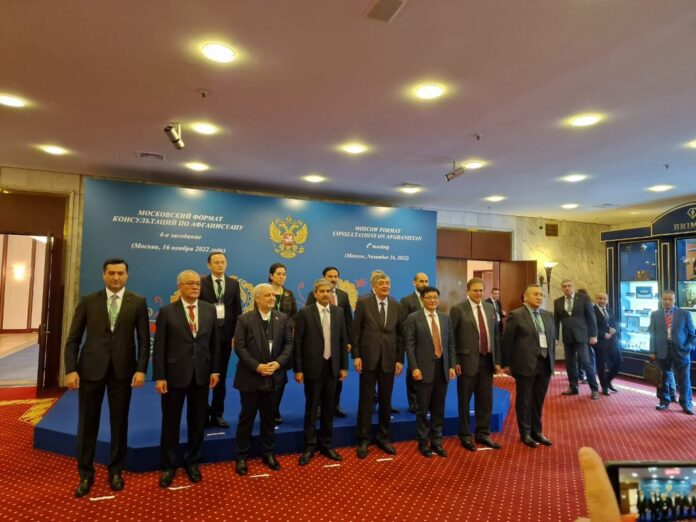At Moscow Format, leaders called for prudent and thorough solutions for Afghan issues, urged the world to prioritize the country’s political and economic growth, and keep the Afghan “voices” alive.
With its multifaceted challenges, Afghanistan seems to be in a Gordian knot. But, as much as it is involved in the global discourse, not much has been ameliorated. With the Taliban’s sporadic and picky interaction with the world and vice versa, Afghans certainly have not benefitted much. Despite having several regional and global summits on Afghanistan since the Taliban assumed power last year, no notable developments have occurred, and in most areas, it is regression rather than progress.
Recently, Russia hosted Moscow Format on November 16, 2022, to discuss Afghanistan’s political, economic, and humanitarian situation. The high-level meeting was attended by officials from more than ten countries including Russia, Iran, Pakistan, India, and China.
We must offer an all-encompassing answer to Afghanistan’s economic problem, said Russian envoy Zamir Kabulov. “In our view, the collective West bears primary responsibility for this. Those who brazenly continued to economically strangle the nation by keeping the frozen assets are the same people that drove the country for 20 years to its current despicable position.”, he said.
We prioritize the growth of political and economic ties and helping the intra-Afghan settlement in our bilateral interactions with the current leadership, Kabulov continued.
Joint Secretary JP Singh of the Indian Foreign Ministry urged collaboration to preserve the Afghan people’s “voice.” To guarantee that Afghan voices and aspirations are heard and to convince them that we are supporting them during this trying period, he said, “we all need to work together.”
Sadeq Khan, the special representative of Pakistan for Afghanistan, urged solidarity for the Afghan people. Taking an unexpected turn on Pakistan’s narrative on Afghanistan, Khan added that while some of the worst fears, such as a rapidly worsening security situation in Afghanistan, a mass exodus of refugees, and a protracted period of instability and violence, did not materialize, the interim Afghan government had also not made the kind of progress that the international community would ideally expect.
“On the issue of inclusiveness, nowhere is this more obvious. The interim Afghan administration has been urged repeatedly by the international community to support more inclusive politics. Unfortunately, not much has been accomplished on this count. The international community should consider working with the Afghan authorities on a hierarchy of priorities. Terrorism and combating drug trafficking could serve as stepping stones for such cooperation.”, said the special envoy.
The Chinese special envoy on Afghan affairs, Yue Xiaoyong, said that the United States shamelessly confiscated the $7 billion assets of the Afghan Central Bank and suspended all development aid.
However, the Islamic Emirate’s response to the Moscow Format was that such gatherings are of no use if representatives from Kabul are not present to speak on their behalf.
While IEA’s claim may be valid, one wonders if the Taliban leaders have acted upon the previous propositions and agreements. From the Doha Agreement and UDHR (Universal Declaration of Human Rights) to other international pacts, demands, and recommendations, what have the Taliban complied with?
However, continuous engagement with the Afghan interim administration is crucial. As much as they still ‘enjoy’ and take pride in their victory after 20 years of fighting the western forces, the Taliban need to realize and do something pragmatic to address humanitarian, political, and social crises in the country. It is also important that the world, especially the West, should not stereotype them and speak on equal terms. At the same time, both Taliban and the international community must understand that paying mere lip service to the Afghan cause would not be of service. Afghan girls in grades 6-12 have missed 15 months of academic education, and 97% of the households live in poverty. The young and bright minds have either left the country or awaiting visas to leave as soon as possible. If all this does not call for immediate attention, then what does?




